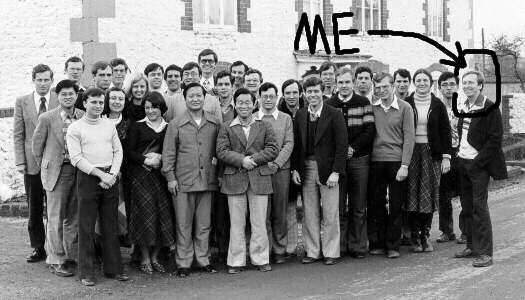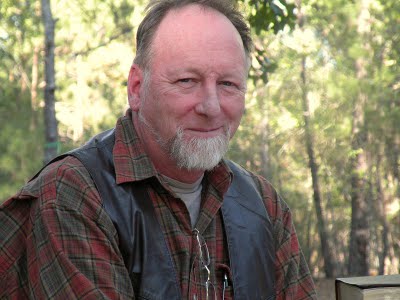

Shortly after I achieved my undergraduate degree, I joined the "Moonies". Their manual to interpreting the Bible The Principle begins with: “Everyone, without exception, is struggling to gain happiness”. At the time this sounded like a brilliant encapsulation of self-evident truth. Perhaps a more revealing way to state this is, ‘we all want what we want, thinking we get some satisfaction by the achievement.’ Human history is a dismal wreckage of attempted satisfaction gone horribly askew.
I can't say that my childhood was particularly happy or unhappy. My father worked hard to provide for the family, my mother stayed home to take care of four children until we got older. We were well cared for. On the other hand, there were a lot of unseen walls, all of which I inherited. My brother rebelled in a classic way. My rebellion was more stealthy, an intellectual distancing that caused me to question and deny. I can recall harassing Sunday school teachers with questions like, “if God created the universe, who created God,” or “explain the Trinity.” Since I wasn't getting answers, I went on to reject the church and eventually God. This atheism is what C.S. Lewis describes as a middle ground, not genuine rejection of God, but a defiant ‘show me’ attitude.
At the heart of it, I wanted to know the truth. For me, happiness would be to know the answers to the great questions of life. I wanted to do the right thing, but didn't have a clue as to what that thing was. I distinctly remember reading Paul Ehrlich's Population Bomb and taking on its superior scientific attitude, that is: holier-than-thou by virtue of superior reasoning. Science and reason became my terra firma.
When I graduated high school I prepared to join the Marines. The Viet Nam War was still on. My father, who had been a Marine, talked me out of it. He never talked about his experiences, so I assumed that he had a poor experience as a Marine in World War II. At eighteen, death didn't concern me, experience did. My father asked me to go to college at his expense and I did. I entered college without the slightest knowledge of what I wanted to do with my life.
I quickly gravitated to the arts, but always in the background was a voracious desire to know. On my own, I studied religion, psychology, sociology, social-anthropology and political philosophy. I read the Bagavad-Gita, the Upanishads, the Diamond Sutra, the Koran, and the Bible cover to cover. I read Marx, Lenin and Mao, plus Nietzsche, Hesse and rafts of popular gurus. If someone came to my door I talked to them, or argued with them would be a more accurate description. I read the Book of Mormon after i got a copy from Mormon missionaries. I spent hours arguing with Jehovah's Witnesses, or my roommate's Transcendental Meditation brother. I dabbled with anything religious. Each quarter we filled out new papers for the college, which included a line for religious affiliation. I answered differently every time: atheist, Buddhist, agnostic, Zen...
While I was drawn to the then popular Eastern religions, I came to the conclusion that they were at their heart all nihilistic. Outside of those forms of Buddhism where you go to a paradise, which seemed like wishing rather than the word of God, most Eastern religions talked about dissolving into Atman, achieving No-mind, etc. The end of them all seemed to be a sort of spiritual suicide or dissolution, making life a cosmic bad joke: your purpose in being here is to go around the wheel of life until you find the door to get out of here.
This left me turning back to Jesus. Here I have to say, I wanted Jesus on my own terms. This is not a rebirth. The Christians that I had met were armed with canned doctrine (Fundamentalism mostly) and not the Holy Spirit. They were easily dismantled with minimum intellectual rigor. None of them stayed long enough for me to peer under the hood. The mainline church of my youth didn't try to answer questions. So I came up with my own Jesus, the historical Jesus who just wanted us to learn to love each other. To follow this Jesus, all that I had to do is to be nice to everyone, even those who didn't deserve it. In this way, so I reasoned, the world would be healed.
What you should be picturing is a muzzy doctrine for those that love Jesus but have no relationship with Him. At this point in my life an attractive Italian girl knocked on my door. She invited me to a meeting of the Unification Church. Well, long story short, I became a “Moonie”. Theologically, the Unification Church is comfortable with most of modern liberal theology, with the one addition: while most liberal theologians see the body of Christ loosely standing in for Jesus, the “Moonies” provide someone specific to stand in for Jesus: Sun Myung Moon. During the course of the next seven years I was attempting to find my way to God in a twisted reflection of modern Christianity.
I graduated from Unification Theological Seminary in 1978 with the equivalent of a Masters of Religious Education. Here is the rub, the program was patterned consciously after major American seminaries such as Union Theological Seminary, Harvard Divinity School, and the Chicago School of Divinity. Almost all the professors were Christian with the exception of one Rabbi who taught the Pentateuch, and one Unification Church member who had a PhD from a Canadian seminary, which I believe was Baptist. There were two Catholics, one teaching counseling, and one teaching Philosophy. Dr. Herbert Richardson, Presbyterian and author of Towards an American Theology, which broke new ground in the fifties, taught theology. Dr. Thomas Boslooper, Dutch Reform and author of Virgin Birth and co-author of The Femininity Game, taught church history. Early church history was taught by Dr. Tsirpanlis, a Greek Orthodox who studied on the Isle of Patmos and a man with a deep love for the early church fathers. And finally, Dr. Warren Lewis, ostensibly from the Church of God in Christ, or something similar, but claiming to be the Devil's advocate. He was a graduate of Tubingen University where Luther taught and became my faculty advisor for The Congress of World Religions, which I instigated while there. Unlike many “cults”, the Unification Church was fully engaged with the Christian church and with world religions in general because theologically they weren't that much different. Theologically they were very close to the Christian “New Age” movement, but because of a strong dose of liberal theology, often resembled mainline denominations in theological style.

Deja vu, here's me again with my seminary class in England. Notice the group is tightly packed, but I'm a little off to the side. I haven't changed a bit. Well I have changed, you just can't see it so well. At this point two changes are in process. The dogmatism of science no longer clings to me. What I was seeing in the Unification Church was an application of “mind science”, the manipulation of people and events through mental exertion. The Moonies never used the term “mind science”, but it was fundamental to goal setting and their understanding of prayer. This is not unlike Christian Science or the extremes of “Word Faith”. Fortunately I was not really comfortable with that portion of the program. The most disturbing example was a fundraiser I met, who had so thoroughly mastered the art of getting money from people that I felt compelled to give him money. He was nearly able to get money without asking at all. As a result he could raise over two-thousand dollars in a day selling flowers or candy.
The second thing that is changed is that God is beginning to steer me out of this place. I can remember consciously praying, “God, I don't know if Rev. Moon is what he says he is, but I do know that Jesus is what he says he is, so if you want me somewhere else, please lead me there.” This may not be formula, but this is what it takes to place yourself in Jesus hands. From that moment on, I had given Jesus the permission to change my life.
Nothing appeared to change. I was still in the Unification Church. Moreover, no one was witnessing to me. No one was willing to take the time to work through years of twisted logic. There was nothing at all spiritual about how I got out of the Unification Church. I had been “matched” and accepted to marry a French girl, but the time was dragging on. I began a clandestine relationship with a girl that I was working with in the church. We left the church on the last day of 1981. I returned to the only occupation I knew outside of the Unification Church, theater. We married and raised two boys.
I had been raised Presbyterian, and eventually returned to the Presbyterian church. I suffered from one great deficit, although I loved Jesus and was willing to be used by him, I did not have the Holy Ghost anointing. There was no one to lay hands on me, no one to truly disciple me. My relationships at church amounted to academic discussions on spirituality. These were prominent, well educated people who also loved Jesus, but none of them moved in spiritual gifts. Bad science and bad theology gave them the false impression that the gifts resided in a different day and age. I was polished on the outside, I could sit comfortably with Nobel laureates, astronauts and prominent pastors and discuss issues of the day. The inside of me was a different matter. Inside I was frustrated, felt inadequate, and struggled with lusts and ambitions. Simmering turmoil in the home led to a bitter divorce.
These were the darkest days of my life. To talk to people who were real and relaxed, I went out to clubs. This was a downward trend. I drank too much, stared at pornography on the web and fantasized. I still went to church. I still loved Jesus. I was still open to His leading, but I could not hear His voice. I remarried. Things were not going well in the second marriage so I was forced to take radical action. At my wife's suggestion I went to a church which specializes in discipleship, including deliverance.
It was at New Wine Christian Fellowship where I gained a powerful respect for the Bible as it is written and for the Holy Spirit. Although I had written many things, I had nothing that I wanted to publish. I had to open myself to the cleansing of the Spirit before I could grind through the garbage of modern theology, psychology and popular culture. I realize that the works of the New Testament were written in order that my life could be transformed. I had come to Jesus but never begun on the first works. I can now say I have begun. I have the baptism of the Holy Spirit. And I don't just talk about Jesus, I pray for those in distress, I witness to the lost, I encourage and I rebuke. Most of all my relationship with God just keeps getting better.
 Burning Coal home
Burning Coal home